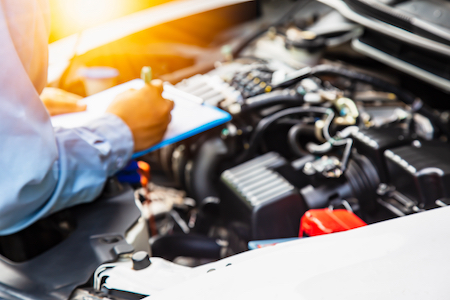The average price of a new car is currently $47,148. Even the average price of a used car has reached an all-time high of $28,219. It’s enough to make you look at your current vehicle in a new light.
But if you’re going to keep your current vehicle, ensuring it’s in good condition will give you peace of mind. Preventative care is crucial to keep it running well years into the future.
Where to begin
If you want your current car to last for years, the first step to take is to learn more about your vehicle. We’re not suggesting you sign up for an auto mechanics class at your local tech school. Instead, dig the owner’s manual out of the glove compartment and spend a few minutes learning more about your car.
We also suggest creating a repair log if you haven’t done so before. Just a simple spiral notebook will do. Log every maintenance item that takes place on your car. You can include receipts for larger items, and keep warranties, if applicable. You’ll never question again when you last brought your car in for repair.
As you run through the owner’s manual, take note of the details. Heed the suggestions of how long different components will last. While manufacturers have suggested guidelines for repair and replacement, while not exact, they do a pretty good job of estimating when things will wear down.
Then get familiar with your car. Pop the hood and get aquainted with where things are and how they look. Doing this regularly will allow you to see changes as they start to occur, and be more aware of when things go wrong.
Have regular inspections
Yes, there are many “fix it” places around town that specialize in one thing. They’ll repair your tires or change your motor oil. But what they won’t do is provide you with a complete assessment of how well your vehicle is running.
That moves to a certified mechanic, a full service shop where they do everything from filling up fluid reservoirs to replacing the entire set of brakes. When a mechanic is vested in ensuring the entire car is running well, they look beyond the narrow focus of a single repair.
We often schedule annual checkups with our physicians to ensure we’re in optimal condition. Regular inspections for your vehicle are designed for the same thing. It’s a chance for a mechanic to peek under the hood and ensure everything is running at its best. When you work with the same mechanic, they can help you plan for replacement, and help keep you aware of when things need repair.
Change the way you drive
Offense and defense. There are two approaches to almost everything in life.
For your vehicle, you can choose to drive fast and push the limits, but it will show up in how well your car looks and runs. Pushing the car to its limits will mean more dents on the outside and more stress on the inside. You’ll have the brakes wear down faster, and more problems with the tires. Each system feeds into another, meaning those minor problems will escalate, and create more stress on all of the systems.
It doesn’t have to be this way. Change your driving patterns, and you’ll notice an improvement in the overall look and feel of your vehicle. Leave a few minutes early, and you won’t have to drive fast, speed through intersections, and slam on the brakes. You’ll have plenty of room to adjust for how others are driving, and be gentler on the entire system every time you ease into the brakes.
Change the fluids
There are many debates online about how frequently you should replace your motor oil. Is it 3,000 miles? 5,000? Or can you go 10,000?
This is where you should refer to your owner’s manual. Your car’s manufacturer had a pretty good idea of the frequency of oil changes. When in doubt, change it out. The motor oil is the lifeblood of your vehicle. If it continues to circulate long after it’s worn down, dirty, and thicker from all the grime, it will impact every component in the engine compartment.
It’s not just motor oil that needs changing. Your vehicle has various fluids that keep it running well. Coolant, transmission fluid, brake fluid – while other fluids don’t require regular changing like motor oil, they won’t last forever. If you keep in mind when they all need replacing, it’ll help your vehicle stay running longer, better.
Lighten up your load
We get it; we all lead busy lives. But weighing your car down with heavy stuff takes a toll on the general health of your car. It puts added stress on your tires, and general stress on the engine. It takes extra power to move all of that weight.
You might need sports equipment for the weekend, and work equipment for daily projects. If you create space for it in your garage, it’ll be easy to transfer back and forth. And it will ensure a long life for every system in your car.
Don’t put off maintenance
You’re busy. Surely the dashboard light isn’t that big of a deal; it can wait until next week.
We see it a lot. People hear a squeak, smell an unusual odor, or notice their car drives differently. But they put off a visit for a more opportune time. The thing is, when it comes to car maintenance, the best time is when you schedule it. If you keep pushing it back, your car may break down and leave you stranded by the side of the road.
Minor problems can quickly escalate. And what would have been an insignificant repair suddenly requires a lot more coming out of your pocketbook.
To keep your car in good working condition, don’t ignore the signs. Bring it in for an inspection.
It’s the best way to ensure a long life.

